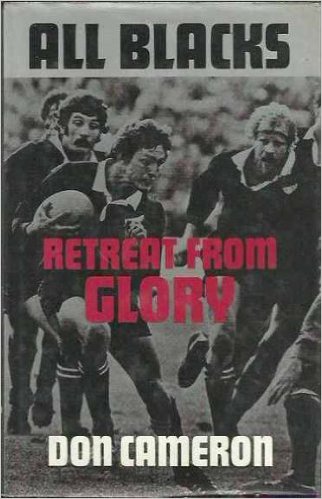DJ The Great
1By The Spotter
Some journalists and writers are brilliant analysts, some are high priests of prose. D J Cameron was both.
In the NZ Herald, it was mentioned that some regarded Cameron’s style as ‘florid’. Florid be damned. Masterful more like. And he was just as good at writing on Rugby Union as Cricket.
A case in point is ‘Retreat from Glory’ (Hodder and Stoughton,1980), a book Cameron wrote on the 1979 All Blacks, about their comparative fall from  the lofty heights of the previous season’s first-ever grand slam success in Britain and Ireland.
the lofty heights of the previous season’s first-ever grand slam success in Britain and Ireland.
There is a passage describing the final All Black test match victory of the 1970s, a dour triumph over a heavily-favoured England on Twickenham ( on the previous Saturday, The North of England team had completely dismantled the All Blacks 21-9, four tries to one). Cameron writes of how the All Blacks somehow found the will to triumph from the mess of the week before. The bumbling England selectors also assisted in thumbing their noses at some deserving North players.
It would be hard to find a better description of what being an All Black represents, but I’ll cease the chat and let Cameron’s words do the talking instead:
“During 1979 various young and not-so-young men put on the prized blazer for the first time and their eyes shone with that inner joy, that sense of longed-for achievement, just as brightly as they have ever done in the past. And from time to time these men pulled on their All Black jerseys for the first or for the umpteenth time and that silver fern on the left breast told them they were guardians of a great tradition”.
“The test match against England at Twickenham last November may well have been the dullest international of the 1970s and the All Black team which played in it may have been, through several extraordinary selections which bordered on panic, the worst that New Zealand had fielded for many years. Certainly about Twickenham that cool, grey afternoon there were many who offered both opinions and not all of them were Welsh, or unwise”.
“Yet from that lugubrious test match, the last major All Black engagement of the 1970s- a decade saved from the memories of two defeats by South Africa and one by the British Isles by the grand slam in Britain of 1978- there shone through one ray of hope for the 1980s. On that November afternoon those 15 New Zealanders played with such intensity, such pride in their team and its jersey, that one could look past the mistakes, the fumbles, the austerity of tactics and see beyond it a team defending a noble tradition. This may or may not have been the worst team New Zealand have fielded, whatever the thought that the 1979ers who played five matches each in Scotland and England were the least effective of any All Black sides which have toured Britain”.
“It was certainly not the best All Black team to run out for a test match. There were obvious faults in selection, both before the tour and before the test. The level of skill among the tight forwards and in the outside backs was low for a start, and further proscribed by the defensive tactics of the day. Yet because they had pride in themselves, their country and the jersey they wore that All Black team took upon itself a certain indomitable spirit. Against many odds, some of them of their own making, the All Blacks played a test match and because of their staunch spirit they won it”.
Brilliant or florid? You be the judge.
Email me on talltree@xtra.co.nz to react to this or anything else in sport.

ICYMI: David Leggatt relayed a great anecdote in yesterday’s Weekend Herald about encountering the big guns of the Kiwi sports media (including DJC) before the 1987 Rugby World Cup. It almost came across as like meeting a type of ‘media mafia’. And Suzanne McFadden wrote a wonderful piece, as well.